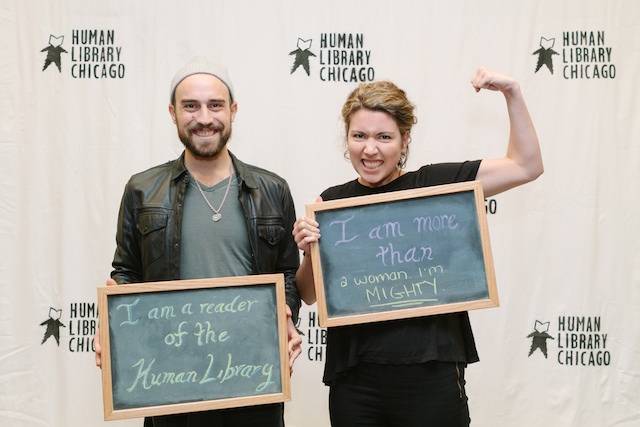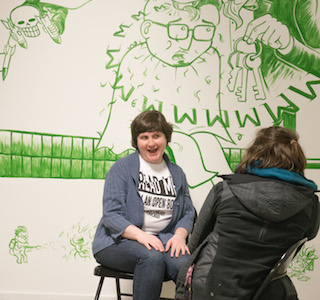The Books Are Alive And Kicking At This Weekend's Human Library
By Tony Peregrin in Arts & Entertainment on Jun 22, 2016 5:04PM

Two Readers at a Human Library Chicago event at the Chicago Public Library, Bezazian Branch in November 2015 (Human Library Chicago)
At Chicago’s Human Library, you don't check out books. Instead, visitors at the Logan Square Arts Fest this weekend will check out human volunteers chosen for their compelling stories—among them a transgender minister, an ex-convict, someone living with HIV and a teen parent. These "human books" loan themselves out to "readers" in an effort to combat prejudice with 20 minutes of storytelling and dialogue.
The Human Library concept originated in Denmark in 2000, and today there are chapters operating in hundreds of cities around the world. That includes Chicago; our chapter held its first event at Printers Row Lit Fest in June of 2014. Marlena Johnson, 27, a resident of Old Irving Park, founded the Chicago series hoping to provide a safe space—typically a street festival or other public venue—for people from disparate backgrounds to talk openly.
So far, Chicago's Human Library events have attracted about 25 active volunteers, including Grace Radkins, 33, of Ravenswood. The title of Radkins’ book: Brain Tumor Survivor. 
Grace Radkins at an April 30, 2016 event at the National Veterans Art Museum (Human Library Chicago)
“One of the biggest struggles I had after treatment was that no one I knew had been through it,” said Radkins. “A common response was ‘my grandma had it,’ which doesn’t help me because I’m not at that stage in my life,” she told Chicagoist, laughing. “At the Human Library events I meet all kinds of people who get it and it is a wonderful, warm feeling... I no longer feel like it is just me.”
Radkins said she avoids pushing a conversation in any particular direction, preferring to let the reader guide the discussion; some readers start firing off questions right away, while others take time to warm up. Both timid and more confident readers, though, inevitably get around to asking Radkins how to talk to someone with a tumor.
“There are a quite a large number of people who are living with brain tumors because they are the kind you don’t operate on and people often ask me ‘How should I talk to them?’ I tell them to be available. Be honest and open and kind and act as you would toward any other friend. In my experience, I’ve found that I appreciated it when my friends didn’t tiptoe around me. They were my friends before and they are my friend now,” said Radkins.
She noted that some novice readers get tongue-tied. “My advice to first-time readers is to not worry too much if you saying the right thing. Get rid of those hang-ups,” said Radkins, who, in addition to volunteering as a book, is the secretary of Human Library Chicago.
Skeptics of the Human Library concept might wonder why people exert the effort to chat with a human book in the Information Age. Learning opportunities are readily available online, on social media, YouTube, Ask Me Anything Reddits. There are also, of course, actual books.
“With the Human Library events, there is structure and there is an expectation that you can’t get from a YouTube video because both book and reader are providing one another with their take on a specific topic,” explained Radkins. The sessions are typically only 20 minutes long, but a relationship develops in that short window—at times, an awkward one.
“Our books have encountered comments that momentarily took them aback,” admitted Johnson. (For example, a reader might be unaware that they should not refer to a book as transgendered.) However, books are trained "to educate rather than chastise a person’s question," Johnson said. "Most of the time, the questions are coming from genuine curiosity and not because someone is being intentionally disrespectful.”
Perhaps the biggest critique of the Human Library is its perceived inability to humanize individuals beyond a single identity. The Human Library Chicago blunts that criticism, in part, through photography.
“We know that everyone is much more than just one identity,” said Johnson. In the Human Library's photo booth, people can assert just that, writing messages like "I am more than my gender" on a chalk board and then posing for a picture with it.
"People have gotten so creative with this!" Johnson said. "I think it is a form of empowerment, one that emphasizes that, yes, I am this identity, but I am also these other things."
The next Human Library Chicago event is June 25 to 26 from noon to 6 p.m. at Logan Square Arts Fest. All Human Library Chicago events are free.